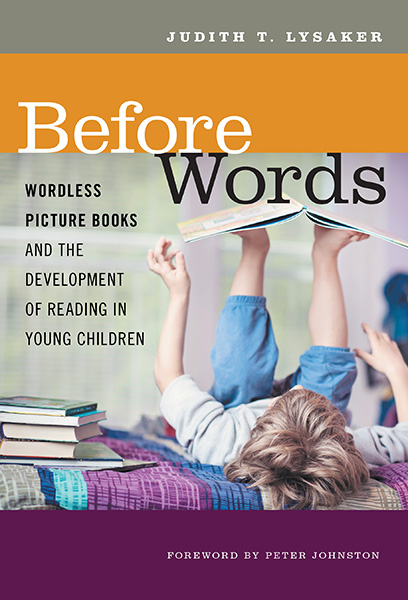Professors: Request an Exam Copy
Print copies available for US orders only. For orders outside the US, see our international distributors.
Foreword by: Peter Johnston
Publication Date: November 23, 2018
Pages: 160
Series: Language and Literacy Series

In this book, the author challenges reductive views of emergent literacy prevalent in many of today’s kindergarten and pre-K classrooms. As an alternative, Lysaker explains how reading wordless books with young children helps them to develop a range of comprehension abilities that are important for understanding narrative texts. Readers will find concrete methods to help them gauge, document, and respond to children as they make meaning of and respond to wordless books. Through description and analysis, the text reveals the undervalued richness of young children’s emergent comprehension and the intricate, purposeful nature of their specific early thinking activities. Before Words encourages readers to think about young children’s comprehension as complex meaning-making and suggests new ways of responding to the unique sense-making tools young children use during wordless book reading.
Book Features:
Judith T. Lysaker is an associate professor of literacy and language at Purdue University.
"In the midst of high-stakes testing and the increase in state and national identification of readers as being delayed as early as kindergarten, this is a welcome text. Lysaker reminds us all that above all else, reading is meant to be an intimate and enjoyable experience. She teaches us to view children’s’ literacy development from a strengths-based approach and encourages instruction to mimic the experience some young children have in the laps of their caregivers: an interactive, dialogic, and relationship-building experience."
—Teachers College Record
“This brilliant and well-researched book is a thoroughly engaging, provocative, and insightful analysis of the process and development of comprehension in young children…. Judy Lysaker has turned wordless books from a curiosity into a powerful learning tool for teachers and children alike…. This book is a breakthrough work. Prepare to have your mind opened to completely new terrain in children’s literate development.”
—From the Foreword by Peter Johnston, The University at Albany–SUNY
"In the midst of high-stakes testing and the increase in state and national identification of readers as being delayed as early as kindergarten, this is a welcome text. Lysaker reminds us all that above all else, reading is meant to be an intimate and enjoyable experience. She teaches us to view children’s’ literacy development from a strengths-based approach and encourages instruction to mimic the experience some young children have in the laps of their caregivers: an interactive, dialogic, and relationship-building experience."
—Teachers College Record
"Before Words is a kidwatcher’s delight! Judith Lysaker provides educators with new ways of noticing and talking about children’s entry into reading through wordless books. Best of all, she helps us imagine how we can take these insights into early childhood classrooms. Her sensitive descriptions of reading conversations provide concrete strategies that will be welcome additions to both novice and experienced teachers’ toolkits!"
— Deborah Wells Rowe, professor, Department of Teaching and Learning, Vanderbilt University
"Wordless picture books have long been recommended for use in early childhood classrooms, but our understanding of how these books both contribute to and reflect comprehension development has been limited—until now. Professor Lysaker takes us deep into young children's interactions with wordless books, meticulously analyzing ways in which children engage with these texts and what we as educators can learn from that engagement. Scholars of early childhood literacy development will find much of interest in this book."
— Nell K. Duke, Ed. D., University of Michigan
Tentative Table of Contents
Foreword
Chapter 1. Introduction
Why Wordless Book Reading
Theoretical Considerations
Wordless Books
The Children, Schools and Classrooms
Wordless Books Read by Children in This Book
What to Expect in This Book
Chapter 2. Comprehending as Orchestration Across Modes
Transmediation: Moving from Image to Oral Narration
Amber, Chloe, and Maya
What Orchestration Contributes to Comprehending
Chapter 3. Comprehending as Embodied
Sense Making as Embodied
Body Reading: Modes of Enactment
Emma, Molina, and Trevor
What Body Reading Contributes to Comprehending
Chapter 4. Comprehending as Imaginative Relationship with Text: Response, Recognition, and Recontextualization
Emotion and Imagination
Amber and Camella
What Response, Recognition, and Recontextualization Contribute to Comprehending
Chapter 5. Comprehending as Relationship with Text: Social Imagination, Narrative Imagination, and Intersubjectivity
Social Imagination, Narrative Imagination, and Intersubjective Enactment
Lenya and James
What Social Imagination, Narrative Imagination, and Intersubjective Enactment Contribute to Comprehending
Chapter 6. Comprehending as Fluency: Prosody and Dialogic Agility
Fluency as Prosody and Movement
Lenya and Hunter
What Fluency as Prosody and Dialogic Agility Contribute to Comprehending
Chapter 7. Wordless Book Reading as Assessment
Why Assess Comprehending with Wordless Book Reading
Using Wordless Book Reading as Assessment
Mapping the Terrain: Using the First Glance Noticing Map with Emma
Reading Conversation Possibilities
Using Noticing Maps Across Time and Texts: One Reader, Two Texts, One Point in Time
Applications for Various Readers and Levels of Development
Managing Wordless Book Reading as Assessment
Chapter 8. Wordless Book Reading in Classroom Life and Final Thoughts
Wordless Book Reading in Everyday Classroom Life
Extending Wordless Book Reading Through Other Literacy Practices
Final Thoughts
Appendix: Wordless Books for Young Children
References
Index
About the Author
Download appendix supplement as a PDF.
Professors: Request an Exam Copy
Print copies available for US orders only. For orders outside the US, see our international distributors.